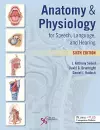
Anatomy and Physiology for Speech, Language, and Hearing
3 authors - Hardback
£144.00
J. Anthony (Tony) Seikel, PhD, is emeritus faculty at Idaho State University, where he taught graduate and undergraduate coursework in neuroanatomy and neuropathology over the course of his career in Communication Sciences and Disorders. He is co-author of numerous chapters, books and research publications in the fields of speech-language pathology and audiology. His current research is examining the relationship between orofacial myofunctional disorders and oropharyngeal dysphagia. Dr. Seikel is also co-author of Neuroanatomy and Neurophysiology for Speech and Hearing Sciences also published by Plural Publishing in 2018. David G. Drumright, BS, grew up in Oklahoma and Kansas, taught electronics at DeVry for several years, then spent 20 years as a technician in acoustics and speech research. He developed many programs and devices for analysis and instruction in acoustics and speech/hearing. He has been semi-retired since 2002, working on graphics and programming for courseware. He is also co-author of Neuroanatomy and Neurophysiology for Speech and Hearing Sciences also published by Plural Publishing in 2018. Daniel J. Hudock, PhD, CCC-SLP, is an Associate Professor of Communication Sciences and Disorders in the College of Rehabilitation and Communication Sciences at Idaho State University. He is currently serving as the Speech Language Pathology Graduate Program Co-Director and Founding PhD in Rehabilitation and Communication Sciences Program Co-Coordinator. He has published over 30 articles and given over 100 presentations with several recent ones being invited half-day and full-day podium talks. In his TEDx Talk (https://bit.ly/2oAYeKC) entitled, "Please Don't Finish My Sentence", he presents about his experience living with a stutter. Dr. Hudock has successfully completed several grants and is an avid volunteer within the profession and associations focused on fluency disorders, including serving in leadership positions, including the coordinating committee of ASHA's SIG 4 on Fluency Disorders. His two primary tracts of research focus on 1) better understanding, assessing, and treating fluency disorders through holistic interprofessional partnerships with mental health professionals and 2) the neuroscience of speech perception and production in people who stutter using high-density EEG and time-frequency analysis. He is the founding director of the Northwest Center for Fluency Disorders that offers an intensive interprofessional stuttering clinic with speech-language pathologists collaborating with counselors and clinical psychologists through an Acceptance and Commitment Therapy (ACT) informed framework in the treatment of adolescent and adult stuttering. Lastly, he has taught courses on Anatomy and Physiology of the Speech and Hearing Mechanisms and Speech and Hearing Science for over a decade, starting as a graduate teaching assistant at East Carolina University in Greenville, North Carolina.